 A.
Amirthalingam
A.
Amirthalingamby T.
Sabaratnam(Volume 2)
Three Lessons
Tamil people drew three important lessons from the All Party Conference (APC) of 1984. They were: the Sinhala leadership and the Buddhist clergy are unwilling to accommodate Tamil aspirations; Sinhala leaders are not interested in a political settlement; the safety and security of the Tamil people depend on the armed strength of the Tamil militants.
The APC was inaugurated with great fanfare at 10 a.m. on 10 January 1984 at the BMICH. The TULF delegation headed by Amirthalingam arrived at the conference venue under army escort. I met them at the entrance. I was there to cover the conference for the Daily News. I asked Amirthalingam for his reaction. "APC is a historic event, a turning point," he said.
Amirthalingam pinned high hopes on the APC. He told me after the inauguration that Jayewardene welcomed him with a broad smile. Sivasithamparam, president of the TULF, quipped, Awvalavum Nanchu (All that is poison).
 A.
Amirthalingam
A.
Amirthalingam
Sivasithamparam’s comment reflected the disenchantment TULF leaders suffered on the opening day itself. They felt that President Jayewardene had let the Tamils down. They felt that he was turning the APC into a forum to safeguard Sinhala interests. In his inaugural address, Jayewardene defined the objectives of the conference thus: "Firstly, the ensuring of the sovereignty and independence of the country; secondly, the continuation of the unitary state and its integrity; and thirdly, to work jointly to eliminate all forms of violence."
Tamil protest was against the unitary state. But Jayewardene had made the continuation of the unitary state an objective of the conference! And he did not utter a word about the resolution of the ethnic conflict! He did not mention a word about Annexure C, the basis on which the TULF decided to attend the APC.
A shocked Amirthalingam remained silent. Irrepressible Tamil Congress leader Kumar Ponnambalam raised the issue of Annexure C by questioning the authorship of Annexures B and C. "Whose documents were they?" he asked. Jayewardene replied evasively, "They are original conference documents." Kumar Ponnambalam persisted. He asked, "Who prepared them?" Jayewardene answered, "The conference secretariat."
Kumar Ponnambalam, in his characteristic manner muttered, "All the documents placed before this conference have parents. But Annexure C is an orphan." Thondaman intervened and adopted Annexure C as his document.
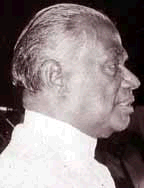 Saumiyamoorthy
Thondaman
Saumiyamoorthy
Thondaman
The first few days were allocated to the opening statements of party leaders. The TULF, TC and CWC met on 18 January to map their strategy. They decided that Amirthalingam, Kumar Ponnambalam and Thondaman should press for the acceptance of Annexure C proposals and demand an autonomous region consisting of the northeast for the Tamils. The thrust of the statements made by Amirthalingam, Kumar Ponnambalam and Thondaman the next day, 19 January, was to press for the acceptance of the proposals outlined in Annexure C.
Amirthalingam made his statement first. He told the conference: "We come to participate in this All Party Conference on the basis of the proposals contained in Annexure C. We feel that they will not meet all our grievances and problems of the day, but we can take them as a basis for discussion and improvement."
Amirthalingam structured his lengthy opening statement into two parts. In the first part, he showed that Tamils are a distinct nation living for generations in northeast Sri Lanka, ruling themselves. They were conquered by the Portuguese in 1617. Then they were ruled by the Dutch who ousted the Portuguese and later by the British who defeated the Dutch. The British unified the administration of the country in 1833, but treated the Tamils and the Sinhalese equally. Tamils were discriminated against after state power passed into the hands of the Sinhalese. After the grant of independence in 1948, Tamils were systematically discriminated against. He then traced the various acts of discrimination.
In the second portion of his address, he traced the history of the non-violent struggle Tamil people waged to regain their rights and detailed the usage of state and mob violence to crush them. He declared that the demand for a separate state was the result of Sinhala violence, which endangered the safety, and security of the Tamils. He declared that the Tamils are prepared to give up the demand for a separate state if suitable alternate arrangements were made where the Tamils of the northeast could rule themselves.
Kumar Ponnambalam, who spoke next, told the conference that the demand for a separate state was the demand of the Tamil people. The entire Tamil population is behind that demand, he said. But the Tamils are prepared to live with the Sinhalese if they are accepted as equal partners and suitable arrangements are made to permit them live in security, safety and self-respect.
Thondaman and DWC leader Abdul Aziz said Annexure C provided a fair solution to the ethnic problem. The left parties, LSSP and CP, were also supportive. The All Ceylon Muslim League, too, supported the creation of provincial councils.
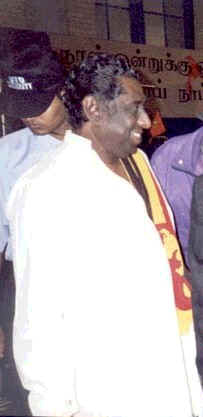 Kumar
Ponnambalam
Kumar
Ponnambalam
The emerging majority opinion in favour of Annexure C disturbed Jayewardene and Premadasa. The uncomfortable situation to which the UNP was pushed was evident from Premadasa’s statement of 25 January. He spoke in general terms without committing himself to any definite position.
Diluting Strategy
Jayewardene wriggled out of this corner by opening the floodgates for Sinhala chauvinism. In the guise of making the opinions expressed at the conference more representative, he invited racial and religious bodies. He invited the Supreme Council of the Maha Sangha, All Ceylon Buddhist Congress, All Ceylon Sinhala Buddhist Organization, All Ceylon Hindu Congress, Christian and Islamic delegations. Tamils and India considered this move as a dilution of the conference and a purposive strengthening of the Sinhala position.
The Supreme Council of the Maha Sangha and the Buddhist associations adopted hard positions. Rev. Dr. Rahula Thera of the Maha Sangha gave the lead to Sinhala extremists. He rejected Annexure C and the Tamil demand for regional councils, saying their creation would amount to the establishment of the separate state of Tamil Eelam. "We will never allow it," he declared.
Having introduced the Sinhala hardliners into the conference, Jayewardene adopted his other strategy of dragging out the discussions to win time to implement his program to induct Israeli intelligence and foreign mercenaries. He prolonged the proceedings, reduced the number of sittings and gave long adjournments.
Jayewardene declared on 20 January, the seventh day of the conference, that the conference would break up into two committees, one dealing with the systems of government and the other with the eradication of terrorism and asked the delegates to decide how the committees should work. The discussion went on for a few days and then Jayewardene declared that the view that both committees should meet together had emerged. The committee, which included officials, thus became larger than the plenary!
The members of the delegations of the joint committee were then asked to prepare and submit working papers expressing their point of view on the two matters. Guidelines were also issued about the preparation of the working papers. The guidelines contained seven items. They read:
As guidelines for the work, it is felt that the working papers should contain suggestions for-
(a) the maintenance of the unity and integrity of the country and accordingly to evolve a system of government to ensure that members of all communities should live in harmony and continue their vocations peacefully in all areas,
(b) providing fair opportunities in education,
(c) providing fair opportunities for employment.
(d) providing systems of land settlement,
(e) providing systems of security for the inhabitants of all areas,
(f) providing opportunities for economic growth, and
(g) any other matters.
The dilution of the conference was taken a step further! Talk of Tamil rights have been skillfully stifled. Now it has become a question of dealing with Tamil grievances.
The Joint Committee met two days in January, three days in February and two days in March to consider the views of the various delegations. The discussion meandered without focus. Thondaman, a skilled tactician, raised the question of ending the curse of statelessness as one of the Tamil grievances. Jayewardene seized on that matter. That was an area where he could satisfy his cabinet colleague Thondaman and show India and the world that the APC had achieved something.
Jayawardene met the Maha Sangha delegation for a private discussion. He told them that the only legitimate right India had to interfere in Sri Lankan affairs was to protect the interests of the Indian Tamils in Sri Lanka. If the stateless Indian Tamil persons were granted Sri Lankan citizenship then India would not have any right to interfere in Sri Lankan affairs. Jayawardene told them that the numbers of people involved were also not that big. The Mahanayakes swallowed that.
Athulathmudali was the conference spokesman. He briefed the media after every meeting of the APC. I covered those briefings. Athulathmudali announced that the conference had on that day decided that the stateless problem should be ended. He described that as the first major achievement of the APC. Just then, the door to that room opened. The Mahanayakes were standing outside. Rev. Dr. Rahula, a highly respected monk, told Athulathmudali that they wanted to address the media. Athulathmudali conducted them in.
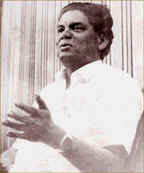 Lalith
Athulathmudali
Lalith
Athulathmudali
Rev. Rahula announced that the APC had unanimously accepted the resolution on ending statelessness proposed by the Supreme Council of the Maha Sangha. He announced India would from now have no locus standi to interfere in Sri Lankan affairs. "Sri Lankan Tamils are our citizens. India cannot interfere on their behalf," he said.
The following is the text of the resolution proposed by the Supreme Council of the Maha Sangha.
"We should not have a category of persons who call themselves Indian. This can easily be achieved by sending back those who have to be sent to India as stated in the Sirimavo – Shastri Pact and giving citizenship to the rest. Even though the numbers may be a little more, the Supreme Sangha Council declares that the Council is not opposed to their being given citizenship in order to arrive at a solution to this problem."
The resolution speaks of sending back to India those who have to be sent to India. Under the Sirimavo – Shastri pact of 1964 and the Sirimavo – Indira Gandhi Pact of 1974 India agreed to take back 600,000 of the 975,000 persons of Indian origin and Sri Lanka undertook to grant citizenship to the balance 375,000 persons. In the 15-year period granted to apply for Indian citizenship, only 504,000 persons applied. The shortfall of 96,000 continued to be stateless. Thondaman urged Sri Lanka to grant citizenship for that category. The Maha Sangha agreed that they be granted Sri Lankan citizenship.
Question of consensus
The Joint Committee concluded its discussions on 15 March and Jayewardene summoned the plenary on 20 March. He announced that the three matters he had indicated in his opening address had been sufficiently discussed and consensus had evolved on four areas. He summarized the areas on which consensus had emerged as follows:
· System of Government - On the need for devolution of Central Powers to enable the people’s participation in Government at all levels. No final understanding has been reached as to the form of Government to which powers could be devolved.
· Local Government - Revival of elected local government bodies. UNP had proposed the establishment of voluntary Gramodaya Mandalayas at Grama Sevaka level and elected Pradeseeya Mandalayas at AGA level. Method of election had not been finalized.
· Ending of Statelessness - The Maha Sangha had proposed the resolution on ending statelessness.
· Ethnic Violence and Terrorism - Causes of violence and all forms of terrorism in all parts of the country must be eradicated.
Amirthalingam objected to Jayewardene's claim of consensus. He said the TULF was not aware of any consensus. Jayewardene's reply was blunt. He said, "My decision is the consensus."
Then Jayawardene sprang another surprise. He announced the adjournment of the APC meeting to May 9. Taken aback, Amirthalingam asked for the reason for the seven-week adjournment. Jayewardene replied that the committees needed that period to prepare their reports.
Amirthalingam and Kumar Ponnambalam wrote, on 23 March, a joint letter to Jayewardene protesting against the long postponement. In that letter, they expressed the fear that the government was preparing to launch a major military offensive. The joint letter said:
"There is fear in the minds of the Tamil people that the government is launching a major offensive in the Northern and Eastern Provinces under the cover of eradicating terrorism in which many innocent people are likely to become victims."
The fear expressed in the joint letter was not unjustified. Jayewardene was, in fact, preparing for a military onslaught. He had brought down Israeli intelligence and military trainers. Armoured cars and sophisticated weapons had been bought from South Africa. A new army unit named the Gajaba Regiment was in the process of formation. He appointed Lalith Athulathmudali as Minister of National Security and gave him a clear mandate to destroy Tamil militancy.
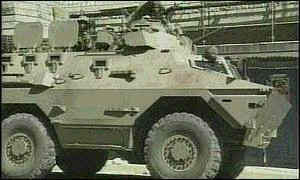 The
LTTE
took
up
that
challenge.
It
raided
the
Point
Pedro
Police
Station
on
24
March,
killed
two
airforce
men
on
26
March,
exploded
the
first
car
bomb
on
9
April
and
mobilized
the
people
on
10
April
to
retaliate
against
army
terror.
(See
Chapter
15
for
details)
These,
and
the
destruction
of
the
Naga
Vihare,
infuriated
Jayewardene.
The
LTTE
took
up
that
challenge.
It
raided
the
Point
Pedro
Police
Station
on
24
March,
killed
two
airforce
men
on
26
March,
exploded
the
first
car
bomb
on
9
April
and
mobilized
the
people
on
10
April
to
retaliate
against
army
terror.
(See
Chapter
15
for
details)
These,
and
the
destruction
of
the
Naga
Vihare,
infuriated
Jayewardene.
Hitting hard at those who hit him was Jayewardene’s character. Taking revenge was part of his approach to politics. His determination to destroy Tamil militants, especially the LTTE, increased. He prepared the ground for a severe military punishment through the use of the powerful media network he commanded. Two modes of action were devised. The first was to isolate Tamil militants and destroy them. To do that, Jayawardene should show that the moderate TULF had become irrelevant. They were not in a position to control the militants. He told the Indian weekly India Today of 30 April that the TULF had become irrelevant.
Athulathmudali explained Jayewardene’s position in a series of interviews to the media and in his speeches at various functions. In an interview to Mervyn de Silva of the Lanka Guardian, he posed the question: "What is the use of talking to the TULF?" and provided the answer himself: "There is no use in talking to the TULF. It no longer represents the Tamil people. It is scared of the terrorists. And the government cannot talk to the terrorists."
The TULF and the Indian policy planners understood the significance of Jayewardene’s strategy. They realized that Jayewardene was trying to capitalize on US President Ronald Reagan’s anti-terrorism campaign. They understood that he was planning a major military operation to eradicate the Tamil armed groups.
Amirthalingam felt he was powerless. In his statement to the APC on 9 May, he meekly said, "…if our credentials are now challenged by the very person who invited us for the negotiations, it is obvious beyond any manner of doubt, that there is no intention to have a negotiated political settlement of the problem."
Jayewardene’s disinterest in a political solution had become clear to the TULF and India by May. They knew that he was dragging his feet. Jayewardene announced on 9 May the setting up of two committees:
· Committee on Devolution - To work out the structure, powers and functions of the unit of devolution. Chairman Premadasa.
· Committee on Grievances - To consider measures that need to be implemented with regard to the equalization of opportunities in education, employment and exercise of language rights. Chairman K.W. Devanayagam.
The TULF, Tamil Congress and Communist Party showed their disenchantment with the APC by announcing that they would not participate in the committee meetings, but would rejoin the conference when it resumed in plenary and were prepared to consider the reports put up by these committees.
In his concluding remarks, Jayewardene said:
"These two committees have important functions to perform. Many youngsters in the North are looking more to the committee dealing with employment and education. Devolution of power means political powers to a few in the political parties. Broad basing employment and educational opportunities means helping a large section of the future generation."
Tamil youths mocked Jayewardene’s remarks. Militant groups ridiculed the TULF leaders. "We told you that Jayewardene is making use of you to deceive the international community and human rights organizations," they teased Amirthalingam. TULF leaders raised the matter with Parthasarathy. "Be patient," was his advice.
The committees met five times in May. The TULF and TC participated in the plenary held on 1 June. Amirthalingam called upon the government at that meeting to make a serious and concerted effort to work out a solution to the ethnic problem with a due sense of urgency. He brought to the attention of the conference the escalation of army violence.
Jayewardene did not pay heed to Amirthalingam’s appeal. He had just returned from his 2-week visit (19-31 May) to China, Japan and South Korea and was busy building the environment for his visit to the USA, Britain and India. In China, he arranged for the purchase of weapons and in Japan and South Korea obtained substantial funds.
Military Option
Jayawardene's concern during that time was to neutralize India by pushing Indira Gandhi and her government into a defensive position. Premadasa, the India baiter, proved handy for that purpose. Premadasa launched a two-pronged campaign. The first was to cut the base under the Indian sponsored Annexure C proposal for regional councils. He carried the campaign through Parliament and the media. He told Parliament that the government was prepared to give the Tamils only District Councils. He encapsulated the government position thus: District Councils and no more.
The second campaign was to weaken and neutralize India’s support to the Tamils. Premadasa took up the role of India-tormenter. He told a public meeting, "Sri Lanka, a free and sovereign nation, has the right to seek assistance from whatever quarter it deems fit." He told Parliament in the last week of March, "We will stand any challenge. We won’t let India bully us. I make this statement on behalf of the Government of Sri Lanka."
Premadasa also accused India of using double standards, one for India and another for Sri Lanka. He said India was dealing the Sikh and Kashmiri rebels with iron fist while preaching to Sri Lanka not to do the same. "Our complaint is that they have allowed our own people to get there and prepare for terrorism and wage war against our country. That is our complaint. What would be the position of India if we allow the Sikhs to come here and train themselves to fight the Government of India? We would have been blamed. But we will never do that. We will never allow anybody to use not only our soil or anything else to wage war or invade any other country in this world. That is our policy. We do not want any country to behave in that fashion. We want others to follow our example."
Premadasa told Parliament in early April, "Why are you encouraging these terrorists there? If you want to invade this country, if you want to swallow this country, do so openly without trying to hide."
Premadasa’s attack on India and his work of undermining Annexure C proposals continued in May and June. The government attack on the TULF also continued during this period.
Frustrated by the manner in which Jayewardene conducted the All Party Conference and irritated by the constant media attack, Amirthalingam told the media that the TULF would "resort to non-cooperation with the government."
Jayewardene reacted with anger. The LTTE, that followed the government - TULF confrontation with mirth, issued a statement on 28 June telling Jayewardene it was they who actually mattered. The statement said, "Ignoring us and having negotiations with the TULF cannot have any meaning as the confrontation will continue if the settlement is not satisfactory from the point of view of the struggle."
The July issue of the LTTE’s official organ Viduthalai Puligal went further. In its editorial, it said: "The All Party Conference will not provide a solution to the Tamil problem. The history of the past 17 years proves it. The old generation Tamil leaders, who have become bald talking to Sinhala leaders, have not lost their hope of winning Tamil rights through talks.
"They must realize that a revolutionary new generation has come on the political stage. The Tamil people will no longer be entertained by the stale, old political actors. They have lost their relevance. Henceforth, we are going to witness on the stage the history-making exploits of the freedom fighters. They are the new representatives of the Tamil people. They, and not the TULF leaders, are going to be the heroes of the future."
The TULF leadership wanted to show Jayewardene and the LTTE that they still continued to be the main actors in the political stage. The TULF decided to organize a satyagraha at Jaffna Viramakaliamman Kovil on 25 July, the first anniversary of the 1983 July riots. Amirthalingam in a statement said, "Mourning, fasting and prayer to mark the first anniversary of the 1983 anti-Tamil riots will be the forerunner to the non-violent mass struggle to be launched in the island for securing the rights of Tamils."
Sivasithamparam issued a more detailed statement to the media. His statement said that it had become clear that APC would not work out a political solution acceptable to the Tamil people. It reminded the Tamil people that they had placed their trust on the TULF to win back their rights, "That is a sacred task for us. We have tried to do our duty in different ways. We have tried dialogues; we have tried bipartite talks; we have tried persuasion in parliament; we have canvassed world opinion. All have proved fruitless. Mahatma Gandhi has shown a way of action to the weak of the world. We shall go along that path on the 25th of July. We shall be true satiyagrahis. If this causes suffering to the Tamils, we offer ourselves as the first to suffer," the statement said.
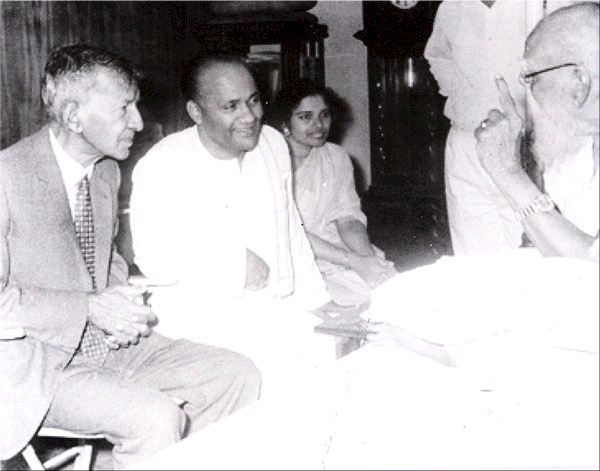 Chelvanayagam,
Amirthalingam
and
Mangayarkarasi
Chelvanayagam,
Amirthalingam
and
Mangayarkarasi
On 25 July 1984 Amirthalingam, Sivasithamparam and about 200 TULF supporters gathered in front of the Viramakaliamman Kovil in Jaffna, prayed and sat cross-legged. Mangayarkarasi sang hymns. Around 200 youths, mostly LTTE and EPRLF cadres and supporters surrounded them. They fired questions at the satiyagrahis. "Where were you all these days?" was the first query. "Are you not ashamed to call yourself leaders after deserting the people in the hour of their need?" was the next verbal missile. Derisive laughter followed the question.
The days of fasts are over, the youth said. Are talks still relevant, they asked the TULF leaders. Guns have begun to fire, they reminded them. Struggle had passed into the hands of the youth, they warned. "Will you please pack up and leave, they advised.
Many of the satiyagrahis walked away. Their number dwindled to below twenty. The number of protesters swelled. Thileepan of the LTTE walked in around 12 noon with food parcels. They placed the parcels opposite the fasting leaders. They sat beside them with their parcels and ate. Amirthalingam announced the end of the fast and walked away in humiliation.
The era of peaceful protest had ended. The era of armed struggle had taken over.
Next
Chapter 19. Burying the TULF
To be posted October 8